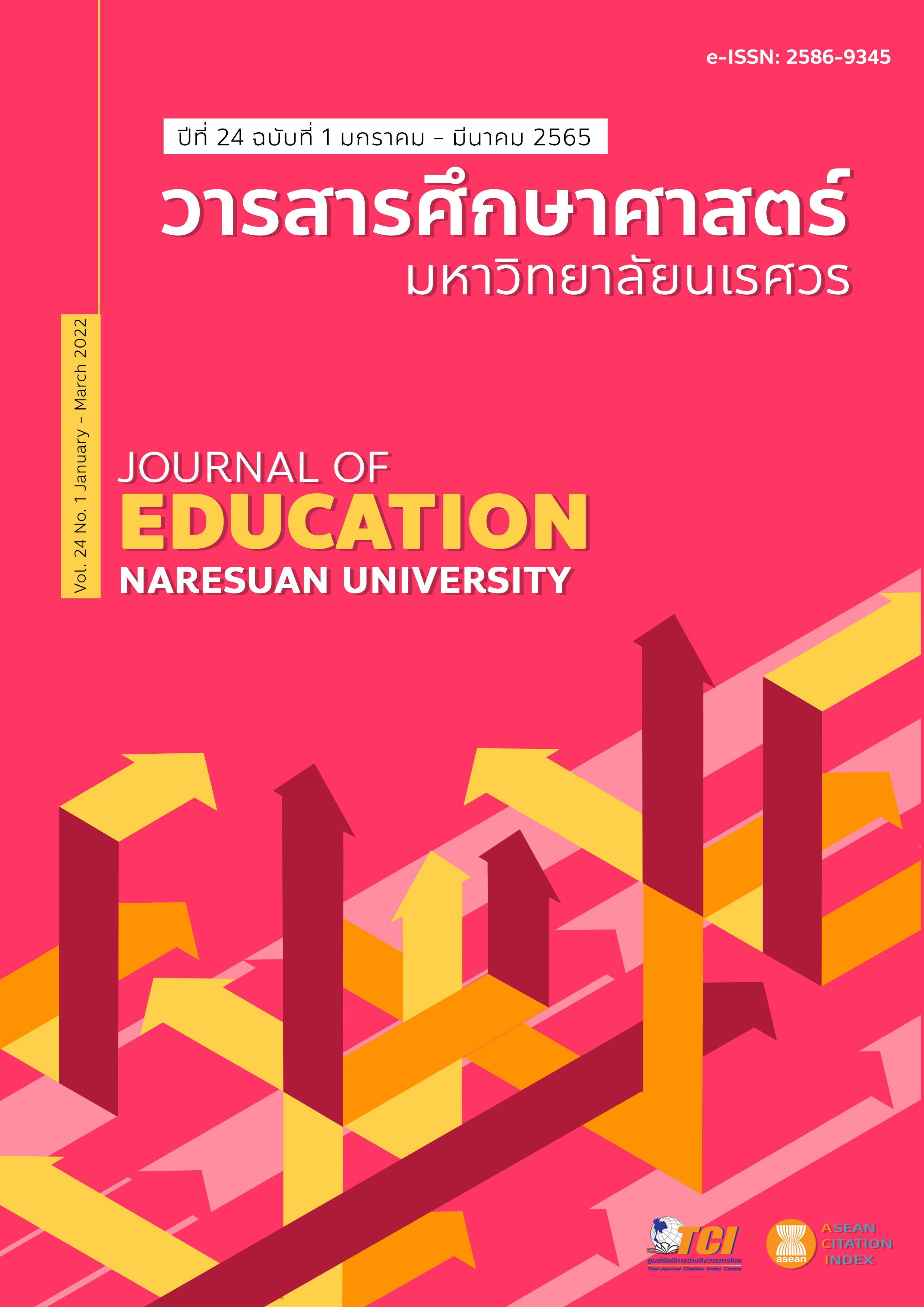ผลการจัดการเรียนรู้โดยใช้วิจัยเป็นฐานในรายวิชาไฟฟ้าและพลังงาน ที่มีต่อกระบวนการทางวิทยาศาสตร์ของนักศึกษาครูวิทยาศาสตร์ EFFECTS OF RESEARCH-BASED LEARNING IN ELECTRICITY AND ENERGY COURSE ON SCIENCE PROCESS OF SCIENCE STUDENT TEACHERS
Main Article Content
บทคัดย่อ
งานวิจัยนี้มีวัตถุประสงค์เพื่อออกแบบกิจกรรมการเรียนรู้โดยใช้วิจัยเป็นฐานในรายวิชาไฟฟ้าและพลังงานสำหรับนักศึกษาครูวิทยาศาสตร์ และเพื่อศึกษาผลของการใช้กิจกรรมการเรียนรู้โดยใช้วิจัยเป็นฐานที่มีต่อกระบวนการทางวิทยาศาสตร์ของนักศึกษาครูวิทยาศาสตร์ ใช้ระเบียบวิธีวิจัยแบบผสมวิธี กลุ่มตัวอย่างคือ นักศึกษาครูวิทยาศาสตร์ ระดับปริญญาตรี คณะครุศาสตร์ จำนวน 44 คน ที่ได้มาโดยการสุ่มแบบกลุ่ม ผลการวิจัยพบว่า กิจกรรมการเรียนรู้โดยใช้วิจัยเป็นฐานที่ออกแบบและสร้างขึ้นประกอบด้วย 6 ขั้นตอน ได้แก่ 1) การสำรวจและสังเกต 2) การตั้งคำถาม/ระบุปัญหา 3) การตั้งสมมติฐานและออกแบบการทดลอง 4) การตรวจสอบสมมติฐาน 5) การวิเคราะห์ข้อมูลและการสรุปผล 6) การนำเสนอผลการวิจัย ใช้เวลาสอน 12 สัปดาห์ ผลการประเมินความเหมาะสมของกิจกรรมนี้ พบว่ามีระดับคุณภาพดีมาก ( = 4.74, S.D. = 0.36) ผลการทดลอง พบว่านักศึกษาเกิดการเรียนรู้ด้วยกระบวนการทางวิทยาศาสตร์ได้ในระดับคุณภาพดีถึงดีมาก (
= 2.9 – 3.3) และผลการวิเคราะห์ข้อมูลเชิงคุณภาพบ่งชี้ว่านักศึกษากลุ่มตัวอย่างได้ฝึกทักษะกระบวนการทางวิทยาศาสตร์หลายด้าน โดยเฉพาะอย่างยิ่งทักษะการสังเกต ทักษะการตั้งสมมติฐาน ทักษะการจัดกระทำและสื่อความหมายข้อมูล ทักษะการทดลอง และทักษะการตีความและลงข้อสรุป นอกจากนี้นักศึกษายังมีความคิดเห็นในเชิงบวกต่อการทำกิจกรรมการเรียนรู้โดยใช้วิจัยเป็นฐานนี้อีกด้วย
Article Details

อนุญาตภายใต้เงื่อนไข Creative Commons Attribution-NonCommercial-NoDerivatives 4.0 International License.
เจ้าของบทความมิได้คัดลอก หรือละเมิดลิขสิทธิ์ของผู้ใด หากเกิดการละเมิดลิขสิทธิ์ ไม่ว่าวิธีใด หรือการฟ้องร้องไม่ว่ากรณีใด ๆ ที่อาจเกิดขึ้นได้ กองบรรณาธิการวารสารศึกษาศาสตร์ ไม่มีส่วนเกี่ยวข้องทั้งสิ้น ให้เป็นสิทธิ์ของเจ้าของบทความที่จะดำเนินการ
เอกสารอ้างอิง
American Association for the Advancement of Science (AAAS). (1967). Science – A process approach. Washington, DC: AAAS.
Bell, S. (2010). Project-based learning for the 21st century: skills for the future. The Clearing House: A Journal of Educational Strategies, 83(2), 39-43.
Bluhm, W. J. (1979). The effect of science process skill instruction on preservice elementary teachers' knowledge of, ability to use, ability to sequence science process skills. Journal of Research in Science Teaching, 16(5), 427-432.
Bybee, R. W., Taylor, J. A., Gardne, A., Scotter, P. V., Powell, J. C., Westbrook, A., & et al. (2006). The BSCS 5E instructional model: Origin and effectiveness. Colorado Spring: BSCS.
Chaidech, T., Chanunan, S., & Chaiyasit, W. C. (2016). Development of collaborative problem solving competency using research-based learning according to STEM education in fossil fuels and products. Journal of Research Unit on Science, Technology and Environment for Learning, 8(1), 51-66. [in Thai]
Chamrat, S., Yutakom, N., & Chaiso, P. (2009). Grade 10 science students's understanding of the nature of science. KKU Research Journal, 14(4), 360-374. [in Thai]
Chanchaichana, S., & Saeng-Xuto, V. (2018). Effect of instruction with science shows to promote science process skills of prathomsuksa 6 students. Journal of Education Naresuan University, 20(4), 219-229. [in Thai]
Faikhamta, C. (2016). PSMT pre-service science teachers’ understandings of nature of science. Journal of Education, Prince of Songkla University, Pattani Campus, 27(2), 21-37. [in Thai]
Hsieh, S. I., Hsu, L. L., & Huang, T. H. (2016). The effect of integrating constructivist and evidence-based practice on baccalaureate nursing student's cognitive load and learning performance in a research course. Nurse Education Today, 42 (Supplement C), 1-8.
Howes, E. V. (2008). Educative experiences and early childhood science education: A Deweyan perspective on learning to observe. Teaching and Teacher Education, 24(3), 536-549.
Ittichinnapat, J. Piromjitpong, S., & Sawadthaisong, N. (2016). The research-based learning model into development preferable numerical analysis skills, communication and information technology skills faculty of bachelor’s degree for Rajabhat Institute Instructors. NRRU Community Research Journal, 10(3), 142-153.
Johnson, N., List-Ivankovic, J., Eboh, W. O., Ireland, J., Adams, D., Mowatt, E., & Martindale, S. (2010). Research and evidence based practice: Using a blended approach to teaching and learning in undergraduate nurse education. Nurse Education in Practice, 10(1), 43-47.
Johnson, R. B., Onwuegbuzie, A. J., & Turner, L. A. (2007). Toward a definition of mixed methods research. Journal of Mixed Methods Research, 1(2), 112-133.
Kijkuakul, S. (2015). STEM Education. Journal of Education Naresuan University, 17(2), 201-207. [in Thai]
Kijkuakul, S. (2018). Qualitative research: A distinguished paradigm and misconceptions. Journal of Education Naresuan University, 20(1), 272-283. [in Thai]
Koocharoenpisal, N., Butnian, N., Jaroensiri, N., & Somjaroen, W. (2016). The effect of utilizing the problem-based learning activity packages on pollution for lower secondary students. Journal of Education Naresuan University, 18(4), 40-55. [in Thai]
Prasertsan, S. (2012). Research-based learning: A new learning paradigm of thailand education. Bangkok: The Thailand Research Fund. [in Thai]
Schoonenboom, J., & Johnson, R. B. (2017). How to construct a mixed methods research design. KZfSS Kölner Zeitschrift für Soziologie und Sozialpsycho logie, 69(2), 107-131.
Tomasik, J. H., Cottone, K. E., Heethuis, M. T., & Mueller, A. (2013). Development and preliminary impacts of the implementation of an authentic research-based experiment in general chemistry. Journal of Chemical Education, 90, 1155–1161.
Tomasik, J. H., LeCaptain, D., Murphy, S., Martin, M., Knight, R. M., Harke, M. A., Burke, R., Beck, K., & Acevedo-Polakovich, I. D. (2014). Island explorations: Discovering effects of environmental research-based lab activities on analytical chemistry students. Journal of Chemical Education, 91(11), 1887-1894. https://doi.org/10.1021/ed5000313
Wilke, R. R., & Straits, W. J. (2005). Practical advice for teaching inquiry-based science process skills in the biological science. The American Biology Teacher, 67(9), 534-540.
Wilson, K. J., & Rigakos, B. (2016). Scientific process flowchart assessment (SPFA): A method for evaluating changes in understanding and visualization of the scientific process in a multidisciplinary student population. CBE-Life Sciences Education, 15(4), 1-14.
Winkelmann, K., Baloga, M., Marcinkowski, T., Giannoulis, C., Anquandah, G., & Cohen, P. (2015). Improving students’ inquiry skills and self-efficacy through research-inspired modules in the general chemistry laboratory. Journal of Chemical Education, 92, 247–255.


